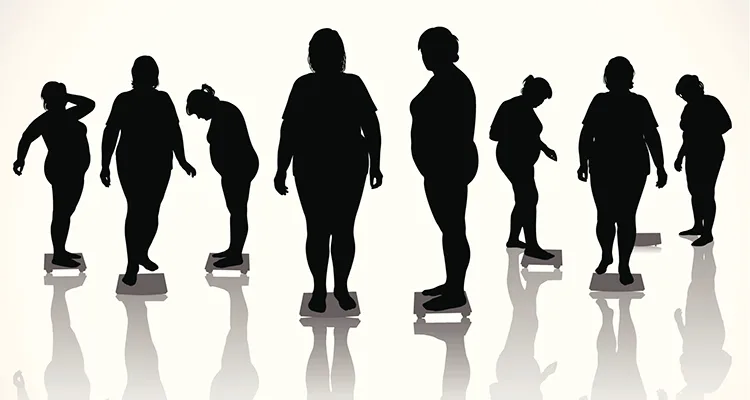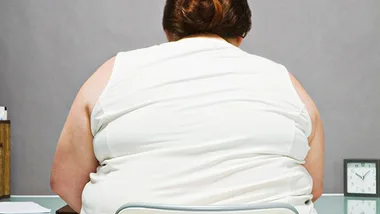Kath Read has been fat since she was a kid, and for the past 30 years she has been picked on for it every day. She has been spat upon, pushed, abused. She’s had rubbish thrown at her from cars. “Just going about my daily business, there’s always someone who thinks it’s okay to point and nudge,” she says. “Not just kids, but women in business suits push me on a train and say ‘get out of the way you fat bitch’.”
She’s tried every diet, pill and potion. She’s suffered bulimia. She’s seen doctors, dieticians, nutritionists. She’s exercised. Her weight has oscillated wildly but the kilos always come back, and as a result, Kath has spent the best part of 40 years feeling like “the most worthless person on the planet”. She has tried to kill herself several times, figuring there was no point in living if she had to live fat.
Many Australians can relate to Kath Read. Statistics released last year show 61 per cent of adults are overweight, and one in four is obese. Governments are urging people to slim down, and many are desperately trying; in 2010-11, Australians spent $789.6 million on weight loss programs, low-calorie products, dietary supplements, low-fat cookbooks and even surgery. Yet, both personally and as a community, we are fighting a losing battle; not only are obesity rates rising, but statistics show that the majority of people who lose weight put it on again, plus more.
According to conventional wisdom, losing weight should simple for those with enough willpower; just consume less energy than you expend, or eat less and exercise more. Following that logic, those who fail are lazy or gluttonous. But as Kath Read already knew, and experts are beginning to learn, losing weight and keeping it off is far more difficult than that, and requires not only relentless discipline, but an almost unwinnable fight against our own bodies.
When we gaze enviously at naturally skinny people, we should remember that a couple of thousand years ago, they would have been gazing enviously at us. In the days when humans were scrounging for their next meal, the genetic pathways that helped some people hang onto fat were key to survival.
Dr Louise Baur, a specialist in paediatric obesity at the University of Sydney, says up to 70 per cent of variation in body size is determined by genetics. Not one gene, but hundreds of them, governing everything from whether cells prefer carbohydrate or fat as fuel, to the way taste works or how the stomach tells the brain it’s hungry. “If we only had one pathway that determined what our bodyweight was and whether we stored fat, the human species would not have survived,” she says.
Nevertheless, obesity only became a problem in the late 20th century, when food became cheap, accessible and processed. This provided the environment for people who already had a genetic bent towards obesity to start tipping the scales at numbers we’ve ever seen before. “We’ve had massive changes to the food environment in the last three decades, and genetically vulnerable people in particular are responding,” says Dr Baur.
Professor Joseph Prioietto from the University of Melbourne, who runs the Weight Control Clinic at Austin Health, is a big believer in the genetic roots of obesity. He points to the science of epigenetics – the idea that we are born with a set of genes, but only some of them are switched on. Environmental triggers determine which ones are which. They could include pregnancy, for example. “Most [women] say they did not have a problem with their weight until pregnancy,” he says. “What we feed our children might be a trigger. If we knew what these triggers might be, we might be able to do something about some of them.”
But we’re not only fighting our genes. We’re also fighting our hormones. There are 10 hormones that affect appetite – one makes us hungry, the others take hunger away, he says. To study their hormonal response to diets, Dr Prioetto put obese people on an extremely low-calorie diet, and found that after weight loss of 10 per cent, the one hormone that makes us hungry increased, but many of hormones supressing appetite decreased, leaving the dieter hungrier than he or she was before.
“It’s not a matter of choice, these are very powerful drives,” he says. “Governments should stop wasting money. That balloon telling us to have a small ice-cream instead of a big ice-cream completely ignores the biology of obesity.”
Other studies show dieting makes our body more efficient at burning fuel, so our energy requirements drop. Someone who has lost 20 kilograms to reach 70kg must eat less to avoid gaining weight than someone who was 70kg all along.
That’s not to say weight loss is impossible in itself; everyone can lose weight, at least for a few weeks, explains Associate Professor Amanda Sainsbury-Salis, principal research fellow at the Boden Institute of Obesity. Keeping it off is tougher. Sooner or later, bodies start fighting back. Even if the dieter is still over 100kgs and on a sensible diet – for example, losing half a kilo a week for 12 weeks – the body triggers its famine response to stop the dieter from losing any more weight. “It not only makes you hungry, it makes you really crave rich foods – carrots and celery sticks don’t cut it,” she says.
With all these factors conspiring against us, it’s no wonder that, despite their most valiant efforts, most people – some put the figure at 95 per cent of dieters – end up putting on more weight than they lost within one to two years. As Professor Sainsbury-Salis explains, “I liken obesity to being a little bit like the Hotel California. You can check out any time you want but you can never leave.”

“Just going about my daily business, there’s always someone who thinks it’s okay to point and nudge.” – Kath Read.
The fight against hormones and genetics is tough enough, but at least that’s a private battle. For many, living in a world that seems to unashamedly discriminate against fat people is the most difficult thing about being obese.
Studies have shown overweight people earn less, are less likely to be promoted and are more likely to be sacked. In the United States, they are less likely to be accepted into college.
Monash University psychologist Leah Brennan is one of the few people in Australia who study the psychology of weight. One of the most severe impacts of obesity in the short-term is on mental health, she says. “For most people, failure is almost inevitable in many weight-loss approaches. You can imagine what it does to your self-confidence. If you’re being blamed for being overweight and blamed for being stigmatised, that’s going to have impacts on your mental health and well-being.”
The stigma of obesity has been compared with the stigma of HIV in the early 1990s, because in both cases, the prevailing view was that people bought it on themselves. This is particularly heartbreaking when sufferers are children.
“Our staff have wanted to cry sometimes,” says Dr Baur, who runs an obesity clinic at Westmead Children’s Hospital. “They hear stories about children being stigmatised, bullied at school, kids moving school, cyber bullying. And it’s not just their peers – their families can have a go at them, adults on the street, school teachers, health professionals. ‘You’re as big as an elephant’, someone told one patient across a crowded waiting room.”
Studies also show that overweight people encounter some of the worst discrimination from health workers, many of whom shame patients for their weight and blame ailments on their size without looking for other possible causes.
This is something Kath Read can relate to. “I was riding my bike and hit my knee on a fence, and did a bit of damage,” she says. “I went to the doctor. She said you need to do some exercise, and I told her I was riding my bike. She wouldn’t even examine my knee, all she heard was ‘fat fat fat fat’.
“Quite a few fat people have had doctors refuse to touch them.”
At age 35, Kath decided to step off the weight-loss treadmill. She couldn’t take the emotional roller-coaster, and her body had been through too much, so she stopped dieting and embraced life.
“I can’t express the difference,” she says. “I spend the first 35 years of my life waiting until I was thin. Now, nothing stops me. I have so much more confidence. My life is joyful. People still make those comments, but what I’ve realised is that other people’s crappy behaviour is not my burden to carry. It doesn’t measure my worth. I still get shocked [by those comments] and of course it still hurts, but I’m not going to let anyone else stop me from living my life.”
Kath has embraced exercise as something to enjoy rather than a punishment. She hasn’t given herself a hard time about the kind of food she eats. And ever since she stopped dieting, she has stopped putting on weight.
Kath has also become what is known as a ‘fat activist’. She writes a blog called Fat Heffalump, on which she discusses everything from her adventures to her ‘fatshion’ and links to fellow bloggers, such as Corpulent and Fat Lot of Good. She speaks out against weight prejudice. “I would like [fat people] to be treated as human beings, with basic dignity,” she says. “Everyone should be able to go about their lives without being vilified or treated like second-class citizens.”

“Obesity is a bit like the Hotel California – you can check out any time you want, but you can never leave.” – Professor Sainsbury-Salis.
Many experts believe we’re taking the wrong approach to obesity, one that encourages failure, shame and discrimination. But the alternatives are few, and often controversial.
A popular movement among fat activists and some doctors is Healthy at Every Size, which focuses on health indicators such as blood pressure and cholesterol rather than weight. Some advocates don’t believe the link between obesity and poor health, while others believe that while excess weight is unhealthy, focusing on weight loss can be counter-productive.
While Kath Read believes her health is no-one’s business but hers and her doctor’s, she supports this approach. So does psychologist Leah Brennan. “Given that the fairly overwhelming research shows losing weight and sustaining weight loss is unachievable, that’s not the best goal for people to change their health risk behaviour,” she says. “If we teach people how to change their behaviour for the sake of health itself, they can continue to do that regardless of what happens to their weight.”
When Regina Benjamin was made Surgeon General of the United States, she was widely criticised for her weight, with many questioning the message she sent to a country struggling as much as Australia with its waistline (her supporters pointed out that US President Barack Obama still smokes cigarettes). “I exercise regularly, at least four days a week,” she reportedly replied. “I tend to stay on the elliptical as long as other people. I’m not out of breath. You can be healthy and fit at different sizes. The real message is that you don’t want to limit yourself by your dress size.”
Dr Sainsbruy-Salis, however, disagrees with the Health At Every Size movement. “I don’t think it’s possible to be healthy at any size,” she says. “I think it’s possible to live a healthy lifestyle at any size, and to do your best to be healthy at any size, and there are individuals who are overweight and obese and are metabolically healthy – those people are lucky, they have genes that make them immune to insulin resistance or the development of diabetes.”
She believes there is an answer to the weight loss conundrum. “We just haven’t found the best answer yet,” says Dr Sainsbury-Salis.
“We used to think that 95 per cent of people who lost weight will gain it back again, but the success rate is much better than that – 35-40 per cent of people who are losing weight are able to keep it off. Some people say that these people must be obsessed and have disordered eating, but there is a significant proportion of people who have lost over 13, 15, 29 kilos and are keeping it off.”
Dr Sainsbury-Salis is working on an experiment to find out whether the body fights less if the weight loss is very slow (she lost 28 kilos over six years and has kept it off for 13 years). She believes gastric banding is a good option for people who have tried everything.
Weight loss is also more effective if the dieter seeks help during the maintenance phase. “One of the things you absolutely must do is get help. People think of getting help while they are losing weight, they don’t often get help in the maintenance phase, but that’s when you most need help.”
Dr Baur agrees that it’s possible for people to lose weight and keep it off. But this requires big changes to their environment, which can be very difficult. “You could move to cultures where there is a different food and physical environment, such as Japan, or you can change your environment,” she says. “That’s really hard. You have to be hugely motivated to do that.” People have more success if they lose weight as a family, and joining community weight-loss support groups helps too.
Dr Baur believes obese people should not be stigmatised. But she also believes that the health problems caused by excess weight should not be minimised, either. “I see, clinically, a severe, chronic, relapsing disease,” she says. “We need to see it in that sense and not see it as some sort of cosmetic thing.”
We might not know the answers yet, but Kath Read knows what doesn’t work. “Shame never made anyone healthy, not did it make them thin,” she says. “No matter what reason we’re thin or fat, we’re all human beings and we’re people. A lot of people think we are asking for something difficult, when we way we’re treated badly and want to change that. I would like to see us treated as human beings and with basic dignity.”
Keys to a healthy life
Keep television to fewer than two hours a day
Be active outside for at least 60 minutes
Eat breakfast most days
Drink water
Eat together as a family once a day without the TV
Get enough sleep
A version of this story originally appeared in the June 2012 issue of The Australian Women’s Weekly. Photography by Alana Landsberry.
Video: Model with Down syndrome is leading the charge for diversity in the fashion industry.



